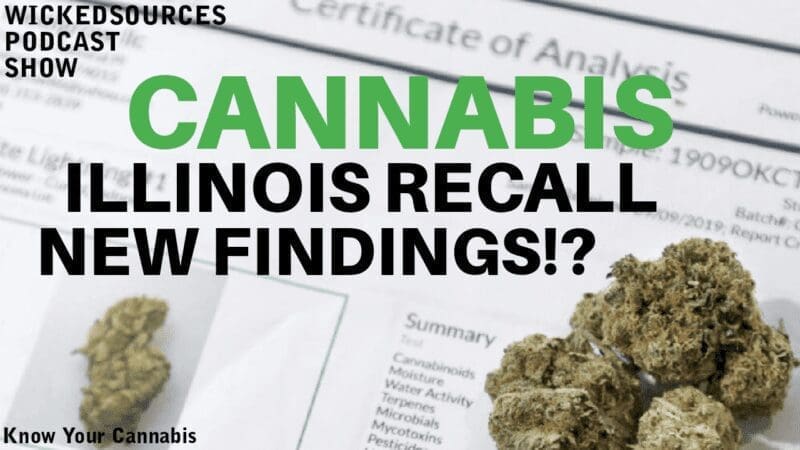Listen To The Full Episode Here The Daily Dose Podcast
Cannabis Recall Illinois What To Know
Introduction: The Info
The cannabis industry in Illinois, like in many other states, has experienced significant growth and transformation in recent years. However, with this expansion came unforeseen challenges, one of the most prominent being the recall that shook the state.
In the spring of last year, concerns emerged in Illinois’s burgeoning cannabis industry. Dispensary workers and consumers began noticing the presence of mold in a popular brand of pre-rolled marijuana joints.
This issue raised questions about the oversight and transparency within the state’s regulated marijuana market. This article delves into the discovery of moldy marijuana joints, regulatory gaps, and the enforcement of cannabis safety standards post recall in Illinois.

Moldy Cannabis Joints Unearthed
State regulators discovered that several batches of pre-rolled joints, produced by Verano Holdings under the name Mag Landrace, might have been contaminated with mold. However, this information was not publicly disclosed till after the recall.
The Illinois Department of Financial and Professional Regulation, responsible for regulating state-licensed dispensaries, chose to quietly direct dispensaries to quarantine the affected products.
Regulatory Gaps and Responsibilities
Illinois boasts some of the strictest regulations nationwide for cannabis safety and quality. However, these regulations do little to ensure that tests for mold, yeast, bacteria, and other contaminants are conducted correctly.
While state regulators have the power to discipline growers, many infractions often go unnoticed, with confidential administrative consent orders used to address them. The investigation into the moldy Mag Landrace weed did not yield any conclusive findings. A cannabis recall was the only acceptable action in light of the news and lack of evidence.

Mixed Reactions From Dispensaries
Amidst the silence surrounding the tainted weed, one chain of dispensaries, Green Thumb Industries’ Rise locations, did inform affected customers. In Niles and Canton, Rise stores serve both recreational users and medical cannabis patients.
Customers were urged to discontinue use of the product and destroy it. This ordeal highlighted the vulnerability of medicinal users who might unknowingly consume moldy cannabis.
Stringent Standards but Lax Oversight:
While Illinois imposes rigorous standards for cannabis quality and safety, the enforcement of these standards remains a significant challenge. Regulations regarding microbiological contaminants like mold, yeast, and bacteria vary between states.
Some states, such as California, even lack requirements for testing certain contaminants. This patchwork of rules and standards has left consumers to navigate varying levels of safety and quality in the cannabis products they purchase.

A Patchwork of State Rules
Each state sets its own rules and limits for cannabis contaminants, leading to a lack of consistency. This issue complicates the enforcement of standards and has raised concerns about how different states handle cannabis quality and safety. Despite these issues, the absence of federal regulation leaves states to establish their individual standards.
The Race for Potency and Lab Shopping
The pursuit of higher THC levels in cannabis products has led to a phenomenon known as “lab shopping.” Some growers seek out labs that provide higher potency numbers. The race for potency has led to concerns that potency numbers might be manipulated. This could pose risks to consumers who pay a premium for higher THC levels.
Transparency and Incentives
Experts argue that transparency and federal oversight would help establish minimum standards for cannabis testing across the country. While this could potentially stifle innovation, it would also set a baseline for consumer protection and product quality. The lack of a federal green light leaves states to navigate these issues independently.

What Happens to Failed Weed in Illinois?
In Illinois, if a batch of cannabis fails a test, it can be processed into other products, provided that it passes all required tests after processing. But the data shared with the agriculture department showed discrepancies, with many microbiological test results erroneously logged as ten times higher than the state’s limits. This was investigated after the cannabis recall.
Conclusion
The moldy weed discovery in Illinois has exposed challenges in the regulation of legal cannabis. While the state has rigorous safety standards, the enforcement and transparency surrounding these standards remain problematic.
The cannabis industry’s growth calls for a reevaluation of the regulatory framework to ensure safe and reliable products for both recreational and medical consumers.
Federal oversight and consistent standards could be crucial steps forward in addressing these issues. Recalls are common in many industries particularly in the food industry. This cannabis recall was no different in the response to take action.
FAQs
What led to the recall in Illinois?
How were consumers affected by the recall?
What actions were taken by regulators in response to the recall?
How has the cannabis industry evolved post-recall?
Related Articles:
- Cannabis Threat Visas Warning Shot News
- Cannabis Tax Revenue Explodes What Now
- Cannabis Recall California Cannabis Corner
- Cannabis Legalization And Substance Use Patterns
- Cannabis News Now Weed Sold At Circle K Now
Meet The Author





